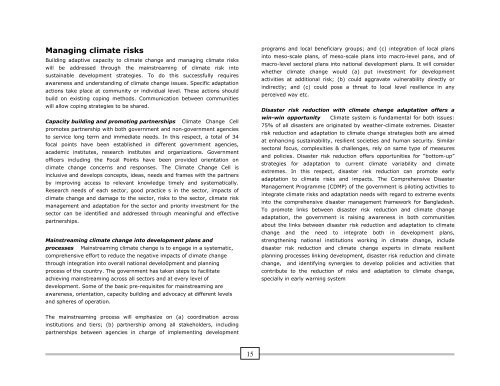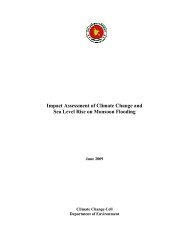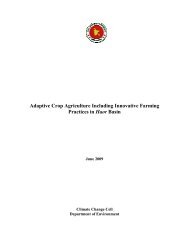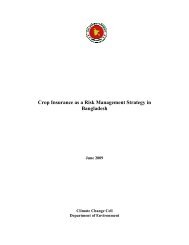CLIMATE CHANGE AND BANGLADESH
CLIMATE CHANGE AND BANGLADESH
CLIMATE CHANGE AND BANGLADESH
Create successful ePaper yourself
Turn your PDF publications into a flip-book with our unique Google optimized e-Paper software.
Managing climate risks<br />
Building adaptive capacity to climate change and managing climate risks<br />
will be addressed through the mainstreaming of climate risk into<br />
sustainable development strategies. To do this successfully requires<br />
awareness and understanding of climate change issues. Specific adaptation<br />
actions take place at community or individual level. These actions should<br />
build on existing coping methods. Communication between communities<br />
will allow coping strategies to be shared.<br />
Capacity building and promoting partnerships Climate Change Cell<br />
promotes partnership with both government and non-government agencies<br />
to service long term and immediate needs. In this respect, a total of 34<br />
focal points have been established in different government agencies,<br />
academic institutes, research institutes and organizations. Government<br />
officers including the Focal Points have been provided orientation on<br />
climate change concerns and responses. The Climate Change Cell is<br />
inclusive and develops concepts, ideas, needs and frames with the partners<br />
by improving access to relevant knowledge timely and systematically.<br />
Research needs of each sector, good practice s in the sector, impacts of<br />
climate change and damage to the sector, risks to the sector, climate risk<br />
management and adaptation for the sector and priority investment for the<br />
sector can be identified and addressed through meaningful and effective<br />
partnerships.<br />
Mainstreaming climate change into development plans and<br />
processes Mainstreaming climate change is to engage in a systematic,<br />
comprehensive effort to reduce the negative impacts of climate change<br />
through integration into overall national develo0pment and planning<br />
process of the country. The government has taken steps to facilitate<br />
achieving mainstreaming across all sectors and at every level of<br />
development. Some of the basic pre-requisites for mainstreaming are<br />
awareness, orientation, capacity building and advocacy at different levels<br />
and spheres of operation.<br />
programs and local beneficiary groups; and (c) integration of local plans<br />
into meso-scale plans, of meso-scale plans into macro-level pans, and of<br />
macro-level sectoral plans into national development plans. It will consider<br />
whether climate change would (a) put investment for development<br />
activities at additional risk; (b) could aggravate vulnerability directly or<br />
indirectly; and (c) could pose a threat to local level resilience in any<br />
perceived way etc.<br />
Disaster risk reduction with climate change adaptation offers a<br />
win-win opportunity Climate system is fundamental for both issues:<br />
75% of all disasters are originated by weather-climate extremes. Disaster<br />
risk reduction and adaptation to climate change strategies both are aimed<br />
at enhancing sustainability, resilient societies and human security. Similar<br />
sectoral focus, complexities & challenges, rely on same type of measures<br />
and policies. Disaster risk reduction offers opportunities for “bottom-up”<br />
strategies for adaptation to current climate variability and climate<br />
extremes. In this respect, disaster risk reduction can promote early<br />
adaptation to climate risks and impacts. The Comprehensive Disaster<br />
Management Programme (CDMP) of the government is piloting activities to<br />
integrate climate risks and adaptation needs with regard to extreme events<br />
into the comprehensive disaster management framework for Bangladesh.<br />
To promote links between disaster risk reduction and climate change<br />
adaptation, the government is raising awareness in both communities<br />
about the links between disaster risk reduction and adaptation to climate<br />
change and the need to integrate both in development plans,<br />
strengthening national institutions working in climate change, include<br />
disaster risk reduction and climate change experts in climate resilient<br />
planning processes linking development, disaster risk reduction and climate<br />
change, and identifying synergies to develop policies and activities that<br />
contribute to the reduction of risks and adaptation to climate change,<br />
specially in early warning system<br />
The mainstreaming process will emphasize on (a) coordination across<br />
institutions and tiers; (b) partnership among all stakeholders, including<br />
partnerships between agencies in charge of implementing development<br />
15





